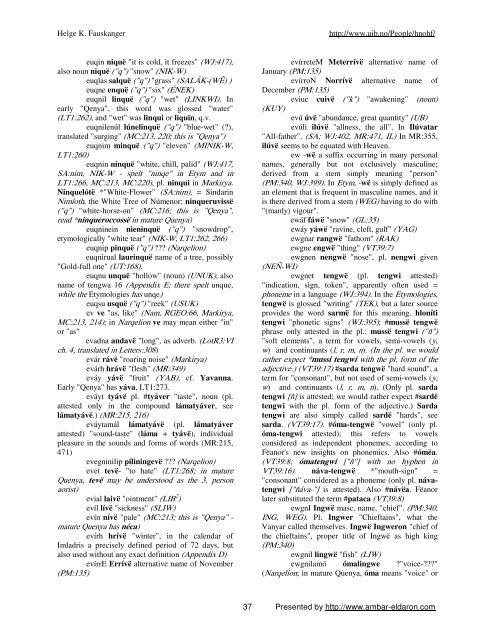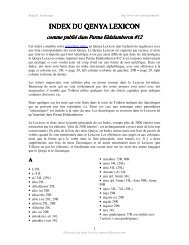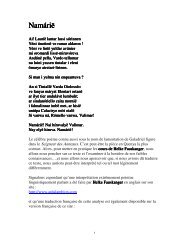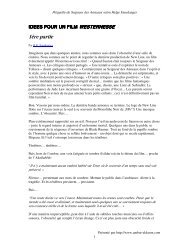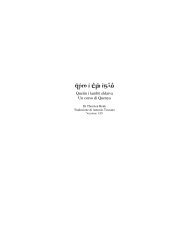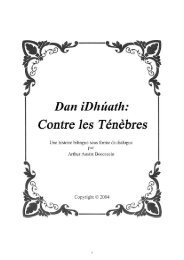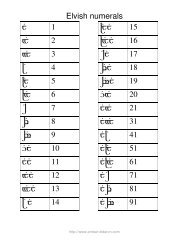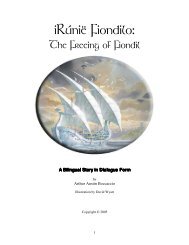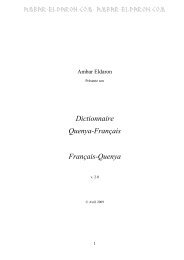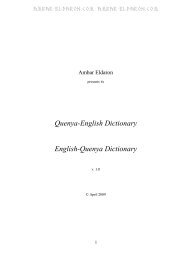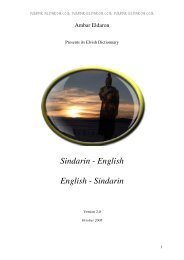Quenya Reverse Wordlist - Ambar Eldaron
Quenya Reverse Wordlist - Ambar Eldaron
Quenya Reverse Wordlist - Ambar Eldaron
You also want an ePaper? Increase the reach of your titles
YUMPU automatically turns print PDFs into web optimized ePapers that Google loves.
Helge K. Fauskanger http://www.uib.no/People/hnohf/<br />
euqin niquë "it is cold, it freezes" (WJ:417),<br />
also noun niquë ("q") "snow" (NIK-W)<br />
euqlas salquë ("q") "grass" (SALÁK-(WÊ) )<br />
euqne enquë ("q") "six" (ÉNEK)<br />
euqnil linquë ("q") "wet" (LINKWI). In<br />
early "Qenya", this word was glossed "water"<br />
(LT1:262), and "wet" was linqui or liquin, q.v.<br />
euqnilenúl lúnelinquë ("q") "blue-wet" (?),<br />
translated "surging" (MC:213, 220; this is "Qenya")<br />
euqnim minquë ("q") "eleven" (MINIK-W,<br />
LT1:260)<br />
euqnin ninquë "white, chill, palid" (WJ:417,<br />
SA:nim, NIK-W - spelt "ninqe" in Etym and in<br />
LT1:266, MC:213, MC:220), pl. ninqui in Markirya.<br />
Ninquelótë *"White-Flower" (SA:nim), = Sindarin<br />
Nimloth, the White Tree of Númenor; ninqueruvissë<br />
("q") "white-horse-on" (MC:216; this is "Qenya",<br />
read *ninqueroccossë in mature <strong>Quenya</strong>)<br />
euqninein nieninquë ("q") "snowdrop",<br />
etymologically "white tear" (NIK-W, LT1:262, 266)<br />
euqnip pinquë ("q") ??? (Narqelion)<br />
euqnirual laurinquë name of a tree, possibly<br />
"Gold-full one" (UT:168).<br />
euqnu unquë "hollow" (noun) (UNUK), also<br />
name of tengwa 16 (Appendix E; there spelt unque,<br />
while the Etymologies has unqe)<br />
euqsu usquë ("q") "reek" (USUK)<br />
ev ve "as, like" (Nam, RGEO:66, Markirya,<br />
MC:213, 214); in Narqelion ve may mean either "in"<br />
or "as"<br />
evadna andavë "long", as adverb. (LotR3:VI<br />
ch. 4, translated in Letters:308)<br />
evár rávë "roaring noise" (Markirya)<br />
evárh hrávë "flesh" (MR:349)<br />
eváy yávë "fruit" (YAB), cf. Yavanna.<br />
Early "Qenya" has yáva, LT1:273.<br />
eváyt tyávë pl. #tyáver "taste", noun (pl.<br />
attested only in the compound lámatyáver, see<br />
lámatyávë.) (MR:215, 216)<br />
eváytamál lámatyávë (pl. lámatyáver<br />
attested) "sound-taste" (láma + tyávë), individual<br />
pleasure in the sounds and forms of words (MR:215,<br />
471)<br />
evegninilip piliningevë ??? (Narqelion)<br />
evet tevë- "to hate" (LT1:268; in mature<br />
<strong>Quenya</strong>, tevë may be understood as the 3. person<br />
aorist)<br />
evial laivë "ointment" (LIB 2 )<br />
evíl lívë "sickness" (SLIW)<br />
evín nívë "pale" (MC:213; this is "Qenya" -<br />
mature <strong>Quenya</strong> has néca)<br />
evírh hrívë "winter", in the calendar of<br />
Imladris a precisely defined period of 72 days, but<br />
also used without any exact definition (Appendix D)<br />
evírrE Errívë alternative name of November<br />
(PM:135)<br />
37<br />
evírreteM Meterrívë alternative name of<br />
January (PM:135)<br />
evírroN Norrívë alternative name of<br />
December (PM:135)<br />
eviuc cuivë ("k") "awakening" (noun)<br />
(KUY)<br />
evú úvë "abundance, great quantity" (UB)<br />
evúli ilúvë "allness, the all". In Ilúvatar<br />
"All-father". (SA; WJ:402, MR:471, IL) In MR:355,<br />
ilúvë seems to be equated with Heaven.<br />
ew -wë a suffix occurring in many personal<br />
names, generally but not exclusively masculine;<br />
derived from a stem simply meaning "person"<br />
(PM:340, WJ:399). In Etym, -wë is simply defined as<br />
an element that is frequent in masculine names, and it<br />
is there derived from a stem (WEG) having to do with<br />
"(manly) vigour".<br />
ewáf fáwë "snow" (GL:35)<br />
ewáy yáwë "ravine, cleft, gulf" (YAG)<br />
ewgnar rangwë "fathom" (RAK)<br />
ewgne engwë "thing" (VT39:7)<br />
ewgnen nengwë "nose", pl. nengwi given<br />
(NEÑ-WI)<br />
ewgnet tengwë (pl. tengwi attested)<br />
"indication, sign, token", apparently often used =<br />
phoneme in a language (WJ:394). In the Etymologies,<br />
tengwë is glossed "writing" (TEK), but a later source<br />
provides the word sarmë for this meaning. hloníti<br />
tengwi "phonetic signs" (WJ:395); #mussë tengwë<br />
phrase only attested in the pl.: mussë tengwi ("ñ")<br />
"soft elements", a term for vowels, semi-vowels (y,<br />
w) and continuants (l, r, m, n). (In the pl. we would<br />
rather expect *mussi tengwi with the pl. form of the<br />
adjective.) (VT39:17) #sarda tengwë "hard sound", a<br />
term for "consonant", but not used of semi-vowels (y,<br />
w) and continuants (l, r, m, n). (Only pl. sarda<br />
tengwi [ñ] is attested; we would rather expect #sardë<br />
tengwi with the pl. form of the adjective.) Sarda<br />
tengwi are also simply called sardë "hards", see<br />
sarda. (VT39:17). #óma-tengwë "vowel" (only pl.<br />
óma-tengwi attested); this refers to vowels<br />
considered as independent phonemes, according to<br />
Fëanor's new insights on phonemics. Also #ómëa.<br />
(VT39:8; ómatengwi ["ñ"] with no hyphen in<br />
VT39:16). náva-tengwë *"mouth-sign" =<br />
"consonant" considered as a phoneme (only pl. návatengwi<br />
["ñáva-"] is attested). Also #návëa. Fëanor<br />
later substituted the term #pataca (VT39:8)<br />
ewgnI Ingwë masc. name, "chief". (PM:340,<br />
ING, WEG). Pl. Ingwer "Chieftains", what the<br />
Vanyar called themselves. Ingwë Ingweron "chief of<br />
the chieftains", proper title of Ingwë as high king<br />
(PM:340)<br />
ewgnil lingwë "fish" (LIW)<br />
ewgnilamó ómalingwe ?"voice-???"<br />
(Narqelion; in mature <strong>Quenya</strong>, óma means "voice" or<br />
Presented by http://www.ambar-eldaron.com


